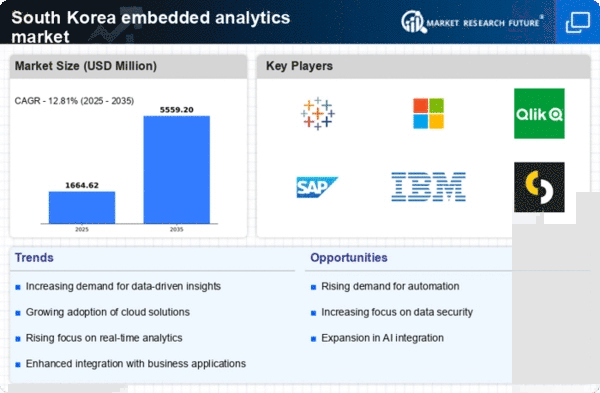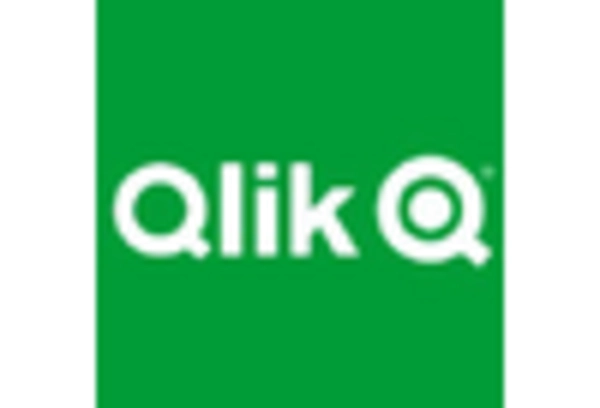Increased Adoption of IoT Devices
The proliferation of Internet of Things (IoT) devices in South Korea is significantly influencing the embedded analytics market. With an estimated 30 million IoT devices expected to be operational by 2026, the demand for analytics solutions that can process and analyze data from these devices is surging. Embedded analytics tools are essential for organizations to derive insights from the vast amounts of data generated by IoT devices, enabling real-time monitoring and predictive analytics. This trend is particularly evident in sectors such as manufacturing and smart cities, where data from sensors and devices can lead to improved operational efficiencies. As the IoT ecosystem expands, the embedded analytics market is poised to benefit from the need for integrated analytics solutions that can handle complex data streams and provide actionable insights.
Rising Need for Real-Time Analytics
The demand for real-time analytics is a significant driver for the embedded analytics market in South Korea. As businesses increasingly operate in fast-paced environments, the ability to access and analyze data in real-time is becoming essential. Organizations are looking for embedded analytics solutions that can provide immediate insights, enabling them to respond swiftly to market changes and customer needs. This trend is particularly pronounced in sectors such as finance and retail, where timely data can influence decision-making and enhance customer experiences. The embedded analytics market is likely to expand as companies prioritize solutions that facilitate real-time data processing and visualization, thereby improving their agility and responsiveness in a competitive landscape.
Regulatory Compliance and Data Governance
Regulatory compliance is becoming increasingly critical for businesses in South Korea, driving the demand for embedded analytics solutions. Organizations are required to adhere to various data protection regulations, which necessitate robust data governance frameworks. The embedded analytics market is expected to grow as companies seek tools that provide insights and ensure compliance with regulations like the Personal Information Protection Act (PIPA). By integrating analytics capabilities into their systems, organizations can monitor data usage and ensure that they are meeting compliance requirements effectively. This focus on governance and compliance is expected to propel the adoption of embedded analytics solutions, as businesses recognize the importance of maintaining data integrity while leveraging analytics for strategic advantage.
Growing Demand for Data-Driven Decision Making
The increasing emphasis on data-driven decision making is a primary driver for the embedded analytics market. Organizations in South Korea are recognizing the value of leveraging data insights to enhance operational efficiency and strategic planning. According to recent studies, approximately 70% of businesses in South Korea are investing in analytics tools to improve their decision-making processes. This trend indicates a robust demand for embedded analytics solutions that can seamlessly integrate with existing systems, providing real-time insights. As companies strive to remain competitive, the need for actionable data becomes paramount, thereby propelling the growth of the embedded analytics market. Furthermore, the ability to visualize complex data sets in an intuitive manner is likely to attract more organizations to adopt these solutions, fostering a culture of informed decision-making across various sectors.
Investment in Digital Transformation Initiatives
The ongoing investment in digital transformation initiatives across various industries in South Korea is driving the growth of the embedded analytics market. Companies are increasingly recognizing the need to modernize their operations and leverage technology to enhance efficiency and customer engagement. As part of these initiatives, organizations are integrating embedded analytics solutions to gain deeper insights into their operations and customer behaviors. Reports indicate that over 60% of South Korean firms are allocating budgets specifically for digital transformation, which includes the adoption of advanced analytics tools. This trend suggests a strong potential for the embedded analytics market, as businesses seek to harness the power of data to drive innovation and improve overall performance.
















